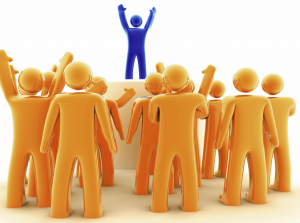 Several research studies have shown that increasing power in an organization (or in any kind of relationship) tends to diminish capacity for empathy, compassion, and seeing another person’s perspective. This is especially damaging to effective leadership of people subordinate to those in power. Studies have shown that increased power diminishes activity of your “mirror neurons,” which provide the sense of connection with another person’s experience, and fuels empathy. Here’s the latest study that sheds more light on what happens. It shows the need for helping leaders develop and strengthen their capacity to connect with others’ reality and experience, which helps counter the tendency towards self-absorption in one’s own perspective, when one is in a higher-power status.
Several research studies have shown that increasing power in an organization (or in any kind of relationship) tends to diminish capacity for empathy, compassion, and seeing another person’s perspective. This is especially damaging to effective leadership of people subordinate to those in power. Studies have shown that increased power diminishes activity of your “mirror neurons,” which provide the sense of connection with another person’s experience, and fuels empathy. Here’s the latest study that sheds more light on what happens. It shows the need for helping leaders develop and strengthen their capacity to connect with others’ reality and experience, which helps counter the tendency towards self-absorption in one’s own perspective, when one is in a higher-power status.
From the study, summarized in Digital Journal:
Sukhvinder Obhi, a neuroscientist at Wilfrid Laurier University in Ontario, Canada and his colleagues Jeremy Hogeveen and Michael Inzlicht, conducted an experiment that shows people in charge can lose their ability to be compassionate because power affects the mirror system of the brain.
A look at the mirror system
The mirror system is activated by neurons in the brain when we watch other people. The study authors write: “For example, with respect to action observation, neural circuits that are related to action execution become active when the person observes someone else making the same action; in other words, the observer’s brain resonates with the model’s motor behavior.”
The brain’s response, or resonance can be measured by looking at the amplitude of brain waves with electromyography (EMG), when one person watches another acting.
The goal of the study was to find out if priming the brain indeed leads to less sensitivity toward others. The authors explain, “… the balance of the literature suggests that people in positions of power tend to act in a self-interested manner and display reduced interpersonal sensitivity to their powerless counterparts.”
Ohbi explains watching someone pick up a cup of coffee, for instance, would tell us that person wants to drink coffee, thus activating the mirror system. To take things further, the mirror system is also linked to deeper thoughts that helps us empathize with what motivates the actions of another person.
The study
For their experiment, the researchers randomly asked participants to journal occasions when they felt either powerful or powerless, to prime the brain. The powerful group was asked to write an essay about a time when they felt in charge. The powerless group journaled an occasion when when someone had power over them. As a control, a neutral group wrote an essay about what happened the previous day. The researchers suspected being in a position of ‘low-power’ would increase resonance in the brain and ‘high-power’ would decrease it. All of the study participants watched a video of someone squeezing a rubber ball while their brain resonance amplitude was measured. The experiment turned out as expected. Ohbi said “when people were feeling powerful, the signal wasn’t very high at all.”
According to an NPR report of the study, Dacher Keltner, a social psychologist at University of California, Berkeley, not involved in the new study said “What we’re finding is power diminishes all varieties of empathy.” The good news Keltner said is that it takes just a bit of coaching to get people in power to regain their empathy and compassion, thanks to a growing field of research.

It is a rare leader indeed – and I have been lucky to work for a few – who understood that authority was not power ‘over’ at group of people, it was accountability for the team’s and the organization’s overall success. And they’re the ones who had empathy; and were not afraid to show it. It made them stronger, more respected, more liked and better leaders.
And it was why people would go to extra lengths to do what was needed, because they knew every request came not only from a place of intellectual honesty but also emotional integrity.
And none of them ever asked us to work longer or harder than they did, and the only person they held to a higher standard that us, was themselves. ‘If you make a mistake, it is on you. If I do, hundreds of people are impacted.’